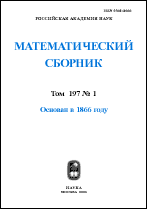|
This article is cited in 14 scientific papers (total in 14 papers)
Subexponential estimates in Shirshov's theorem on height
A. Ya. Belova, M. I. Kharitonovb
a Moscow Institute of Open Education
b M. V. Lomonosov Moscow State University
Abstract:
Suppose that $F_{2,m}$ is a free $2$-generated associative ring with the identity $x^m=0$. In 1993 Zelmanov put the following question: is it true that the nilpotency degree of $F_{2,m}$ has exponential growth?
We give the definitive answer to Zelmanov's question by showing that the nilpotency class of an $l$-generated associative algebra with the identity $x^d=0$ is smaller than $\Psi(d,d,l)$, where
$$
\Psi(n,d,l)=2^{18}l(nd)^{3\log_3(nd)+13}d^2.
$$
This result is a consequence of the following fact based on combinatorics of words. Let $l$, $n$ and $d\geqslant n$ be positive integers. Then all words over an alphabet of cardinality $l$ whose length is not less than
$\Psi(n,d,l)$ are either $n$-divisible or contain $x^d$; a word $W$ is $n$-divisible if it can be represented in the form $W=W_0W_1\dotsb W_n$ so that $W_1,\dots,W_n$ are placed in
lexicographically decreasing order. Our proof uses Dilworth's theorem (according to V. N. Latyshev's idea). We show that the set of not $n$-divisible words over an alphabet of cardinality $l$ has height
$h<\Phi(n,l)$ over the set of words of degree $\le n-1$, where
$$
\Phi(n,l)=2^{87}l\cdot n^{12\log_3n+48}.
$$
Bibliography: 40 titles.
Keywords:
Shirshov's theorem on height, word combinatorics, $n$-divisibility, Dilworth theorem, Burnside-type problems.
Received: 12.02.2011 and 17.10.2011
Citation:
A. Ya. Belov, M. I. Kharitonov, “Subexponential estimates in Shirshov's theorem on height”, Sb. Math., 203:4 (2012), 534–553
Linking options:
https://www.mathnet.ru/eng/sm7853https://doi.org/10.1070/SM2012v203n04ABEH004233 https://www.mathnet.ru/eng/sm/v203/i4/p81
|


| Statistics & downloads: |
| Abstract page: | 702 | | Russian version PDF: | 190 | | English version PDF: | 9 | | References: | 55 | | First page: | 33 |
|




 Contact us:
Contact us: Terms of Use
Terms of Use
 Registration to the website
Registration to the website Logotypes
Logotypes








 Citation in format
Citation in format 
